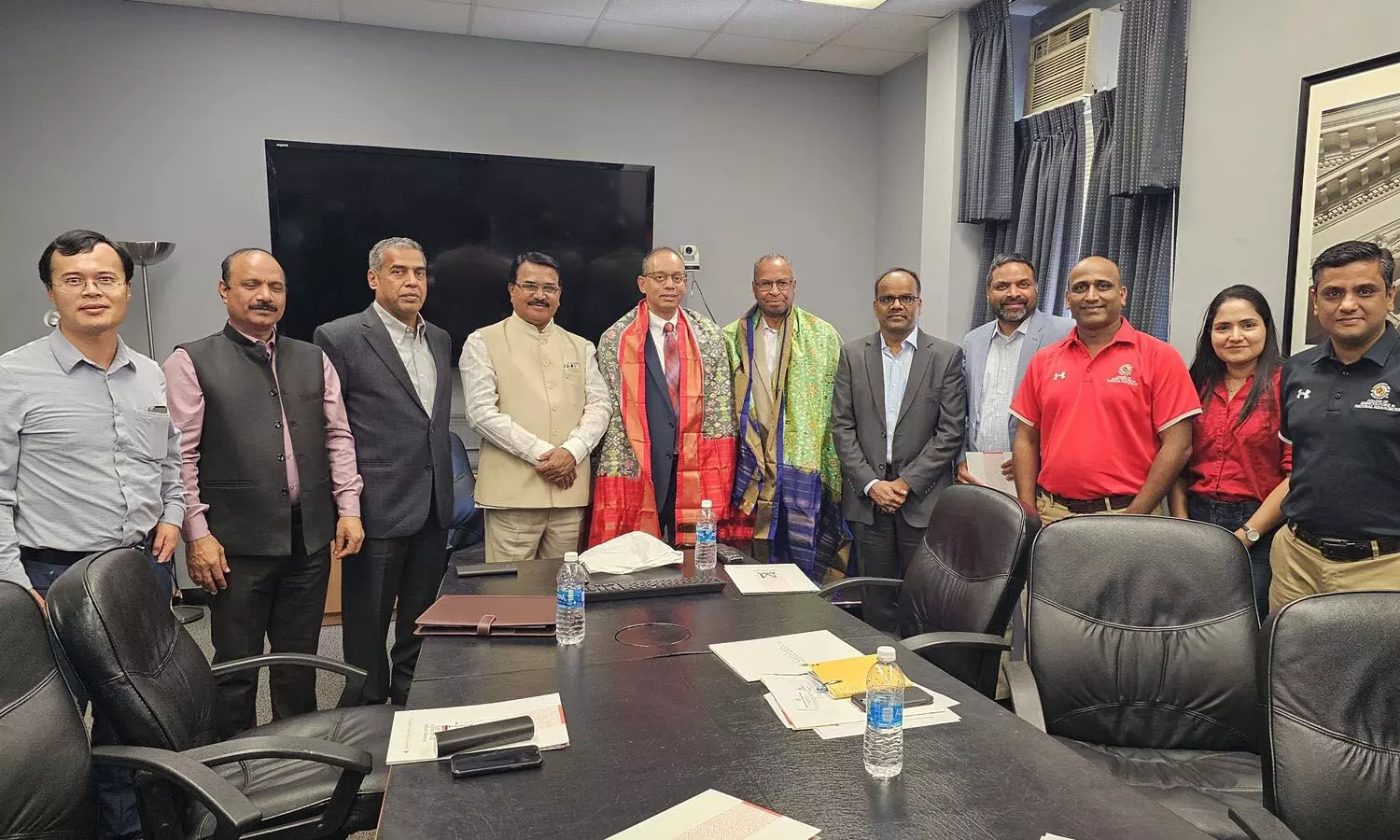Telangana Govt discusses student exchange programme for agriculture development with Maryland University
Telangana Govt discusses student exchange programme for agriculture development with Maryland University NewsTap


Niranjan Reddy held collaborations with Maryland University faculty related to the field of biotechnology such as genome editing and other genetic tools

MARYLAND, USA:
Telangana Agriculture Minister Singireddy Niranjan Reddy, who is on his fifth day of his tour to the United States of America (USA), visited Maryland State University and met the Dean and Director of the University, Craig Beyrouty on Friday.
Collaborations in Biotechnology:
Niranjan Reddy held discussions with Maryland University faculty related to the field of biotechnology such as genome editing and other genetic tools. Discussions were focused on innovative agricultural technology faculty exchange programmes for Agricultural Development and a long-term student exchange programme. (Also funds matching grants for University of Maryland Student Exchange).
Focus on Sustainable Development Goals:
Niranjan Reddy emphasized the importance of the Sustainable Development Goals (SDGs) in the discussions. He highlighted the need for assistance in matters related to soil management, soil health maintenance and improvement, cattle health problems, and issues related to animal husbandry. The National Institute for Food and Agriculture (NIFA) of the US Department of Agriculture had come forward to support Telangana, he said, and added that proposals for further agricultural development in Telangana would be prepared and submitted to them.
Role of Maryland University:
Maryland University played a key role in developing cutting-edge technologies related to robotics and artificial intelligence. Apart from that, the University was known for making useful research and discoveries in key areas like medicine and agriculture, he said.
Meeting with International Food Policy Research Institute (IFPRI):
Later, Niranjan Reddy held a meeting with the representatives of International Food Policy Research Institute (IFPRI) at its headquarters in Washington DC, USA. The discussions aimed at strengthening agricultural cooperation between Telangana and IFPRI. Dr David Spielman Director, Innovation Policy and Scaling, and Dr Paul Dorosh, IFPRI Director of Development Strategies and Governance were also present.
Accompanying Officials:
Niranjan Reddy was accompanied by Telangana Agriculture Secretary Raghunandan Rao, ISTA Presidents, Telangana Seed Development Corporation MD Kesavulu during the visit to Maryland University and IFPRI.
SDGs, Targets, and Indicators
-
SDG 2: Zero Hunger
- Target 2.3: By 2030, double the agricultural productivity and incomes of small-scale food producers, in particular women, indigenous peoples, family farmers, pastoralists, and fishers, including through secure and equal access to land, other productive resources and inputs, knowledge, financial services, markets, and opportunities for value addition and non-farm employment.
- Indicator 2.3.1: Volume of production per labor unit by classes of farming/pastoral/forestry enterprise size.
-
SDG 9: Industry, Innovation and Infrastructure
- Target 9.5: Enhance scientific research, upgrade the technological capabilities of industrial sectors in all countries, in particular developing countries, including, by 2030, encouraging innovation and substantially increasing the number of research and development workers per 1 million people and public and private research and development spending.
- Indicator 9.5.1: Research and development expenditure as a proportion of GDP.
The article discusses Telangana Agriculture Minister Singireddy Niranjan Reddy’s visit to Maryland University in the United States. The issues highlighted in the article are related to biotechnology in agriculture and the exchange programs for agricultural development.
1. Which SDGs are addressed or connected to the issues highlighted in the article?
The SDGs that are addressed or connected to the issues highlighted in the article are SDG 2: Zero Hunger and SDG 9: Industry, Innovation and Infrastructure.
2. What specific targets under those SDGs can be identified based on the article’s content?
Based on the article’s content, the specific targets under the identified SDGs are:
- Target 2.3: By 2030, double the agricultural productivity and incomes of small-scale food producers.
- Target 9.5: Enhance scientific research and upgrade the technological capabilities of industrial sectors.
3. Are there any indicators mentioned or implied in the article that can be used to measure progress towards the identified targets?
The article does not explicitly mention any indicators. However, based on the content, the following indicators can be used to measure progress towards the identified targets:
- Indicator 2.3.1: Volume of production per labor unit by classes of farming/pastoral/forestry enterprise size.
- Indicator 9.5.1: Research and development expenditure as a proportion of GDP.
SDGs, Targets, and Indicators
| SDGs | Targets | Indicators |
|---|---|---|
| SDG 2: Zero Hunger | Target 2.3: By 2030, double the agricultural productivity and incomes of small-scale food producers. | Indicator 2.3.1: Volume of production per labor unit by classes of farming/pastoral/forestry enterprise size. |
| SDG 9: Industry, Innovation and Infrastructure | Target 9.5: Enhance scientific research and upgrade the technological capabilities of industrial sectors. | Indicator 9.5.1: Research and development expenditure as a proportion of GDP. |
Behold! This splendid article springs forth from the wellspring of knowledge, shaped by a wondrous proprietary AI technology that delved into a vast ocean of data, illuminating the path towards the Sustainable Development Goals. Remember that all rights are reserved by SDG Investors LLC, empowering us to champion progress together.
Source: newstap.in

Join us, as fellow seekers of change, on a transformative journey at https://sdgtalks.ai/welcome, where you can become a member and actively contribute to shaping a brighter future.







